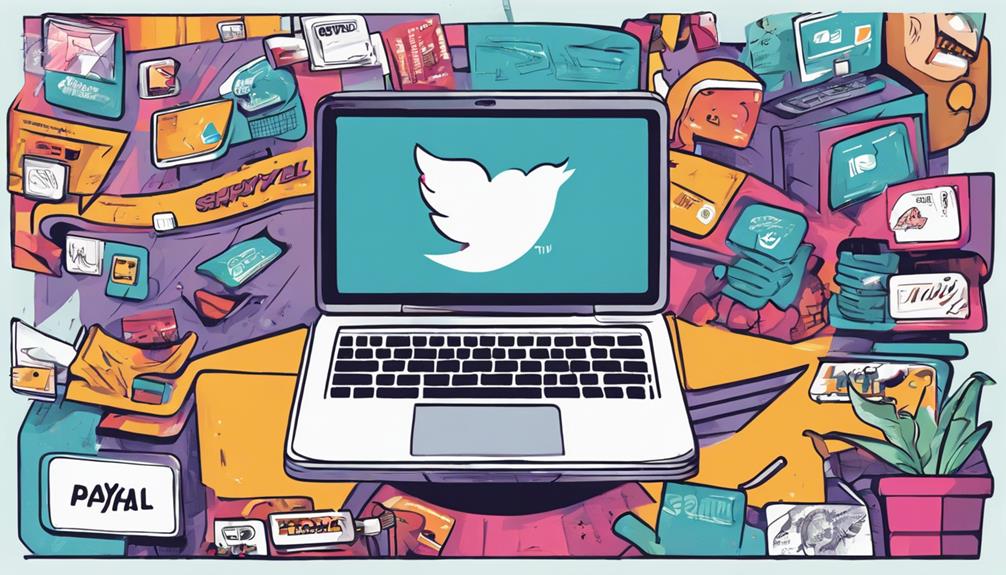Looking to start earning online? Try freelancing on Upwork or Fiverr. Make money by completing projects from home. Next, explore affiliate programs like Amazon Associates for commission rates up to 10%. Also, consider e-commerce on Shopify or Etsy for revenue potential. Content creators can monetize sites like Amazon and Google, earning big bucks. Online surveys on Swagbucks offer an easy way to make extra cash. Want more? Check out sharing economy platforms like Rover or TaskRabbit for additional income opportunities. Ready to boost your earnings? Start your online money-making journey today! For even more **ways to make money online**, consider teaching or tutoring on platforms like **Udemy** or **Teachable**, where you can create courses based on your expertise. You can also try blogging or starting a YouTube channel, both of which offer monetization through ad revenue and sponsorship opportunities. With countless options available, there’s never been a better time to tap into the digital economy and diversify your income streams.
Key Takeaways
- Utilize freelancing platforms like Upwork and Fiverr for quick project-based earnings.
- Join affiliate marketing programs such as Amazon Associates for commission-based income.
- Explore e-commerce platforms like Shopify and Alibaba to start online stores.
- Monetize content on sites like Amazon, Google, and Facebook for high revenue potential.
- Consider sharing economy platforms such as Rover and TaskRabbit for service-based income opportunities.
Freelancing Platforms
When starting to explore ways to make money online, consider signing up on freelancing platforms like Upwork and Fiverr for a range of project opportunities. Upwork, known for its 10% commission fee and high competition, offers a variety of projects that can include digital animation.
On the other hand, Fiverr, with a 20% commission fee, has quick hiring odds if you craft carefully written replies. Both platforms present good earning potential, but keep in mind that projects may require several days to complete.
Upwork operates on a weekly billing cycle, and it's worth mentioning that the approval process for submitted work can take up to 48 hours. While the competition is fierce, quick hiring on Fiverr can be advantageous for freelancers looking to jump into projects swiftly.
Remember to factor in the commission fee when calculating your earnings on these platforms. Keep in mind that there are no age restrictions for starting as a freelancer on either Upwork or Fiverr.
Affiliate Marketing Programs

Consider exploring affiliate marketing programs as another avenue to make money online, tapping into various networks such as Amazon Associates, ShareASale, CJ Affiliate, Rakuten Advertising, and ClickBank. These platforms allow you to promote products or services from top companies for making money, earning a commission each time a customer makes a purchase through your referral link. By strategically selecting high-quality products that align with your audience’s interests, you can maximize your earning potential. Additionally, utilizing strong marketing tactics like SEO and content marketing can further enhance your success with affiliate programs.
Amazon Associates stands out as a giant in the affiliate marketing domain, offering commission rates of up to 10% on qualifying purchases.
ShareASale, on the other hand, boasts a wide array of merchants with different commission rates, providing a diverse range of products to promote.
CJ Affiliate, a well-known affiliate network formerly known as Commission Junction, partners with top brands and adopts performance-based commission structures.
Rakuten Advertising, previously Rakuten Marketing, connects publishers with leading brands, offering competitive commission rates and a broad selection of products.
ClickBank, a prominent global retailer and affiliate marketplace, specializes in digital products and offers generous commission rates that can go as high as 75%.
These affiliate programs present lucrative opportunities for earning money online by promoting top brands and diverse products.
E-Commerce Platforms

When it comes to E-Commerce Platforms, you have a plethora of options to explore. From Shopify's impressive $7.1 billion in annual revenue to Alibaba's staggering $72 billion, these platforms offer vast earning potential.
Best E-Commerce Platforms
Shopify stands out as one of the top e-commerce platforms, boasting $7.1 billion in revenue and a range of subscription-based services. This platform allows you to set up your online store, sell products, and start earning money online through various plans tailored to your needs.
If you're looking to sell unique products or crafts, Etsy might be the perfect choice, earning $3 billion in revenue through commissions.
Alibaba, a giant in the e-commerce industry, rakes in $72 billion primarily from online retail sales.
Priceline focuses on travel bookings and accommodations, making $9.22 billion in revenue through commissions.
ASOS, specializing in fashion and apparel, generates $3.55 billion in revenue from online retail sales.
Whether you're into online courses, unique items, or general retail, these e-commerce platforms offer diverse opportunities to make money online through commissions and selling your products.
Tips for Success
In order to maximize your success on e-commerce platforms, it's essential to leverage multiple revenue streams and diversify your online income sources. Utilize platforms like Shopify to create your online store and start selling products.
Amazon Associates offers an affiliate marketing program where you can earn commissions by promoting products. Consider joining the YouTube Partner Program to monetize your video content through ads and sponsorships.
Explore opportunities on Upwork for freelance work, connecting with clients for various projects and services to earn money online. Additionally, platforms like Fiverr allow you to offer your skills and services as gigs, providing a way to make money through freelancing.
By diversifying your income sources across e-commerce platforms, affiliate marketing, freelance work, and other online opportunities, you can increase your chances of success and grow your online income.
Stay engaged on social media to promote your ventures and attract a wider audience, further enhancing your online earning potential.
Content Monetization Sites

Content monetization sites offer various ways for you to earn money online. From ad revenue potential on platforms like YouTube to affiliate marketing opportunities on blogs, there are multiple avenues to explore.
Understanding different monetization strategies and payment options can help you maximize your earnings on these sites.
Site Revenue Potential
To understand the site revenue potential of content monetization sites, analyze their diverse income streams and audience engagement strategies.
Websites like Amazon, Google, and Facebook showcase the immense earnings potential achievable through online retail, digital content, and advertising revenue. These top-earning platforms generate consistent revenue, attracting global interest with their various revenue sources.
Amazon's revenue of $18,250 per second stems from online retail, cloud computing, and digital content sales, while Google's $5,785.95 per second is driven by advertising, cloud services, and hardware products. Facebook, earning $4,273.50 per second mainly from advertising, demonstrates strong earning potential as well.
Understanding revenue generation on websites involves considering factors such as ad volume, click-through rates, and audience demographics. By analyzing these elements, websites can optimize their revenue potential and capitalize on the diverse income streams available in the digital landscape.
Payment Options Available
When exploring payment options on content monetization sites, various methods are available to facilitate earnings for content creators and freelancers. Different platforms offer a range of choices for receiving payments, including ad revenue sharing, affiliate marketing, and various direct payment methods. Here is a breakdown of the payment options available on some popular content monetization sites:
| Site | Payment Options |
|---|---|
| YouTube | Ad revenue sharing, channel memberships |
| Amazon Associates | Affiliate marketing, varying commission rates |
| Upwork | Direct bank deposits, PayPal |
| Fiverr | Bank transfer, PayPal, Fiverr Revenue Card |
| Shopify | Credit cards, PayPal, multiple channels |
These options allow content creators and freelancers to choose the method that best suits their needs, whether it be through direct bank deposits, PayPal, bank transfers, or utilizing specific cards for their earnings.
Monetization Strategies Explained
Exploring various monetization strategies on content platforms can reveal diverse revenue streams for creators and freelancers.
For those looking to make money online, leveraging affiliate marketing through programs like Amazon Associates can be lucrative. By incorporating affiliate links to Amazon products on their websites, content creators can earn commissions for driving sales.
Similarly, YouTube offers various monetization avenues for video content creators, including ads, sponsorships, memberships, and merchandise sales. These strategies enable creators to earn money based on their content's performance and audience engagement.
Successful content creators understand the importance of strategic monetization efforts tailored to their platform and target audience. By diversifying income streams through affiliate marketing, YouTube monetization, sponsorships, and merchandise sales, creators can maximize their earning potential.
Whether it's through affiliate partnerships or direct sales, content creators can generate significant income by effectively implementing these monetization strategies on popular platforms like Amazon Associates and YouTube.
Online Survey Opportunities

Discover how you can earn money through online surveys on Swagbucks, a top website for making money online. Swagbucks has paid out over $591 million to participants engaging in various survey topics like advertising effectiveness and product features.
Users have the opportunity to earn between $0.05 and $2.50 (up to $35) per survey on Swagbucks. Although not all participants may qualify for every survey, they're still rewarded for their user participation.
In addition to surveys, users can also earn money by taking part in in-home product trials through Swagbucks. This platform provides a diverse range of opportunities for individuals looking to make money online while sharing their opinions on different products and services.
Sharing Economy Platforms

By leveraging sharing economy platforms, you can easily generate passive income by renting out items, offering services, or selling products locally. Whether you have items to rent out, services to offer, or products to sell, these platforms provide an avenue to make money online. Here are some popular sharing economy platforms you can explore:
| Platform | Specialization | Commission/ Fees |
|---|---|---|
| Rover | Pet care | 20%-25% commission |
| Neighbor | Storage space rental | Set your own rates |
| TaskRabbit | Task completion | Varies |
| OfferUp | Local selling marketplace | Transaction fees may apply |
| Fat Llama | Equipment rental | Insurance coverage included |
Whether you have a knack for freelance writing, want to be a virtual assistant, love pet care, or have items to rent out, these platforms offer diverse opportunities to earn money. From walking dogs to renting out power tools, the sharing economy opens up avenues for individuals to earn passive income conveniently.
Frequently Asked Questions
Which Website Is Best for Online Earning?
For online earning, Upwork, Fiverr, Amazon Associates, Shopify, and YouTube each offer unique opportunities. Explore freelancing, digital services, affiliate marketing, e-commerce, or video monetization. Choose the platform that aligns best with your skills and goals.
How Can I Earn $100 a Day Online?
To earn $100 a day online, you can tap into freelancing platforms like Upwork and Fiverr, promote products with Amazon Associates, start an e-commerce store through Shopify, create content on YouTube, or take surveys on Swagbucks.
How to Earn Money Online Instantly?
To earn money online instantly, explore platforms like Swagbucks. Complete surveys, watch videos, and shop online for quick earnings. Utilize the mobile app for convenience. Your persistence will pay off as you accumulate earnings through various activities.
Which Website Earns the Most Money?
You want to know which website earns the most money. Amazon tops the list, raking in approximately $18,250 per second. Google and Facebook also generate significant revenue, showcasing their impressive earning power in the digital domain.
Conclusion
Now that you have a variety of options to make money online, it's time to take the leap and start earning. Remember, the internet is like a vast ocean full of opportunities waiting to be explored.
So, immerse yourself and see where your talents and efforts can take you. With dedication and the right strategies, you can turn your online endeavors into a lucrative source of income.
Happy earning!









